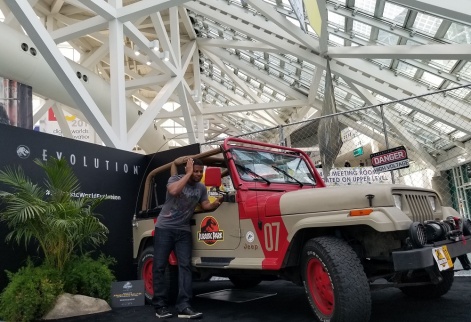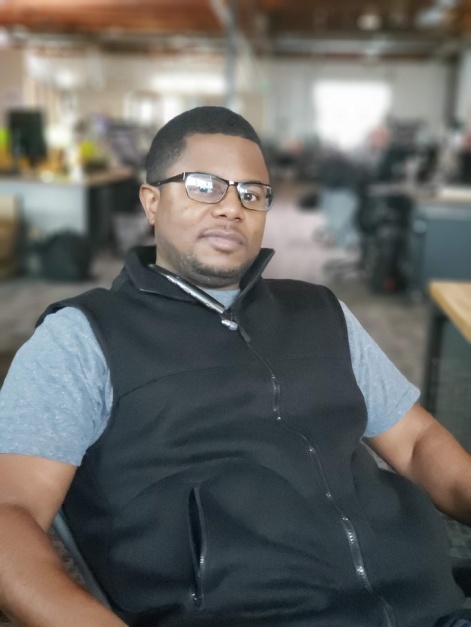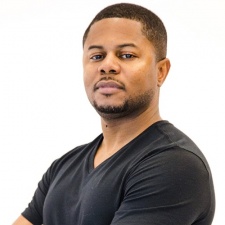We are in a pivotal moment. For decades, no matter the industry, people of colour have suffered through a lack of opportunity and a lack of respect, leaving them stuck playing second fiddle throughout their careers.
Following the tragic killing of George Floyd by a Minneapolis police officer, people around the world have come out in their droves to show support for the Black Lives Matter movement as the community looks to fight for equal rights.
The games industry is no different, and here at PocketGamer.biz we wanted to do our part and help bring attention to the many incredible people of colour that help make up this sector. That is why we are committing to a new long-term regular feature to spotlight these people and their careers.
So, welcome to our new 'POC in Mobile' series, where discussion about finding a place in the games industry, the various challenges faced as a minority, and what truly needs to be done to make games more diverse will be the focal points of conversations.
This week we spoke to Jam City senior manager of player experience Michael Raeford about his 18-year experience in the games industry.
PocketGamer.biz: Can you start off by telling us about your role in mobile games and what it entails?
Michael Raeford: I am the senior manager of player experience at Jam City. It's a new role recently created at Jam City and is a result of our player-first culture and a relentless pursuit to fully understand our players, their needs, and their motivations for playing our games.
I'm primarily responsible for working with all of our game and cross-functional teams to help drive engaging player experiences that create improved loyalty, retention and growth, building on the voice of the player (feedback), and both qualitative and quantitative data.
I co-founded my first games start-up a few months after graduatingMichael Raeford
Why did you want to work in the mobile games industry?
I have played and been obsessed with games since I was about seven years old. I've been in games for over 18 years, and as a result, have witnessed the evolution of the industry first hand. Funny enough, I made my start in the games industry by accident.
After graduating from college with a degree in Finance from North Carolina Central University, a historically black college and university (HBCU), I decided not to go to Wall Street and jumped right into internet start-ups.
I co-founded my first games start-up a few months after graduating and launched what would be the first online games platform to offer skill-based, pay-to-play trivia game tournaments with cash prizes. We named the platform SkillJam (now called WorldWinner), and my journey in games began.
My interest in mobile games was driven primarily by the fact that the future of games was mobile, and every trend confirmed it. Diving into mobile felt like the right move to achieve success in the industry.
How would you recommend people get started in games? Any tools or literature you would advise?
Start by playing some games. You don't have to be an esports, professional level player, but just understand the basic mechanics of games and what players experience as they play.
I would suggest paying particular attention to different feelings as you play as they are key elements to successful game development. Players play games for different reasons and motivations, and understanding those feelings and motivations are critical to the success of any game company, big or small.
The primary tool of choice is simple: a smartphone or tablet, video game console, or a PC that enables you to play games. Again, just play. Play games in different genres. Play games on different platforms. Play games with different mechanics. Play when you're standing in line at the grocery store, as many players do. Just play.

In terms of literature, just like any other industry, it depends on what areas/disciplines you are interested in (marketing, engineering, game development, etc.). Read industry-specific periodicals, books, online resources, and all of the usual suspects in terms of industry research.
If you are interested specifically in game development (the process of actually creating a game), there are some excellent resources like "The Art of Game Design" by Jesse Schell (which I have read twice), "Level Up! The Guide to Great Video Game Design" by Scott Rogers, and many others that you should read, in whole or in part.
What did you study (if anything) for your role? Are there any courses out there that you would advise for aspiring professionals?
I did not study anything game-related in school. Experience has been my best teacher. As my background is heavy in start-ups, I have worn many hats at different times in my career including product development, data and data analysis, finance and accounting, engineering, customer support, and live operations. And all of those roles have shaped me to be effective in my current role.
However, there were some general areas of study that did help me. My business courses in college gave me a solid understanding of that sector, which always helps. I also took computer programming courses, which I still use today as a Python programmer.
I highly recommend taking online courses using services such as LinkedIn Learning, Udemy, Pluralsight, and other online learning platforms. I take at least one course a month. The cost is nominal and you get up-to-date, quality teaching from experienced professionals.
Companies should embrace our differences and use them as a competitive advantage - not as a weakness.Michael Raeford
What do you think should be done to improve diversity, not only across the games industry, but across all industries?
I think diversity and inclusion is something that has to be infused into a company's culture and DNA. There has to be a conscious, intentional effort to truly be diverse and include people of different races, genders, and backgrounds.
What's shocking is that there is study after study that shows companies that have diverse teams perform better financially and operationally, yet companies still do not aggressively implement systems that make diversity a reality.
To have lasting change across an industry, there has to be a collective mindsight across all companies that creating diverse teams is core to the success of their businesses. Companies should embrace our differences and use them as a competitive advantage - not as a weakness.
Employee resource groups can also offer invaluable insight into the needs and understanding of a particular group of people within a company. At Jam City, we created BE (Black Employees) at Jam City, an employee resource group focused on addressing the needs of our black employees. And I think it has had a tremendous impact on not only the black employees but the company as a whole.
A lot of diversity issues in certain industries have to do with educating and equipping our younger generations to compete in those industries. For more technical fields like games, that means introducing more technical and STEM-based programs in schools early in the process.
A large number of African-American students, particularly those in inner-city schools that are sometimes underfunded, are not introduced to the sciences and technical areas of study early enough to develop interests in related college majors or in post-college careers.
What are the biggest challenges you have encountered since joining the industry?
One of the biggest challenges I have faced deals with funding. Back then (and even today) there were very few funding vehicles that focus on African-American entrepreneurs and few venture capital and private equity firms that have African-Americans in decision making roles.
So, when you add in unconscious bias and predisposed thoughts of African-American entrepreneurs, you get an environment where it is harder for African-American entrepreneurs to raise capital.

Another challenge I faced at different times in my career is a type of "imposter syndrome" that can creep into the mindset of any person working or navigating within an industry or organisation with very few people that look like them.
When you constantly see different races, genders, and/or backgrounds other than your own in work settings, there are points where you can feel like you don't belong or experience feelings of being inadequate. Some people get very comfortable with the notion of being "the only one", but it can weigh on some in a very negative way, even causing depression and/or subpar work performance.
What do you think can be done to help encourage more people of colour to get into games?
I think it always starts with education. Educating African-Americans on career opportunities in games, outside of just playing or making games, is definitely a big part of the equation. At the school level, providing tools and programs to give in-roads into the industry are also equally important. Students should see game career opportunities the same way they see engineering or medical field opportunities.
And last but definitely not least, we have to push companies to build more diverse teams. The more people you see that look like you in a particular industry doing well or doing impactful things, the more likely you are to see that industry as an option for you as you move along your career journey.
Is there anything that recruiters should be doing differently to address the lack of diversity across not only games development but all industries?
Most definitely. The first is to go where the diversity is. The old saying of "fish where the fish are" holds true. That means if you are looking for more African-American candidates, a great starting point is recruiting at historically black colleges and universities (HBCUs) and at job fairs that target African-Americans.
There are changes being made that will impact generations to come and we will finally start seeing the progress we have all been hoping for.Michael Raeford
Furthermore, having a team composed of different races, genders, backgrounds and perspectives when recruiting ensures that the end result of the recruitment process will incorporate the team's collective perspectives.
Lastly, working with third-party recruiting firms and services that are well suited for recruiting diverse groups of candidates also helps. There are many services focused on diversity of all kinds and some that are dialled into certain communities better than others. Find these organisations and create partnerships for your recruiting pipeline.
Since the recent surge in the #BlackLivesMatters campaign, what changes (if any) have you seen from across the industry to address the issue?
For most African-Americans, fighting social and economic injustices, police brutality, and deaths involving African-Americans as a result of police brutality is not a new thing. They have been happening for over 400 years at different levels all over the world.
That said, with the recent murder of George Floyd, what I think is new and different this time is the global reaction to the incident. It's like the entire world - not just African-Americans - just woke up and finally said enough is enough.
I have been filled with so much hope and gratitude seeing all of the support for the Black Lives Matter movement from individuals around the world. But what I am equally proud of is the reaction and support from corporations around the world.
Almost every major global company, including many in the games industry, has taken a strong, undeniable stance. And it has not simply been a response with words. It's been a response with action and resources.
It's one thing for individuals to protest issues like police brutality in masse. But when companies that have such a tremendous impact on society also protest and use their resources to help move the cause forward, the likelihood for lasting change improves dramatically.
I think this time, over any other time in our history, there are changes being made that will impact generations to come and we will finally start seeing the progress we have all been hoping for.
What advice do you have for other people of colour that are looking at getting into games?
Start with simply playing games and study the areas of the games industry that interest you. Next, look to your network and see if you know someone in the industry. Reach out to them and see if you can connect, ask questions, and seek advice about the industry. There is no better source of information.
Lastly, I would also recommend a little studying of the history of African-Americans in the games industry and how our influence from the start through now has been profound - regardless of the absolute numbers of African-Americans in the industry today.
When you understand the history and that despite the diversity and racial challenges, significant advancements in games were made by people just like you, it gives you a level of confidence that makes your journey more enjoyable and achievable.
Knowing things like the very first video game console with interchangeable cartridges, the blueprint used for every single video game console to-date, was created by a team led by an African-American engineer (Jerry Lawson), gives you a reason to think that the difficult journey is limitless in terms of your potential impact on the industry.






















